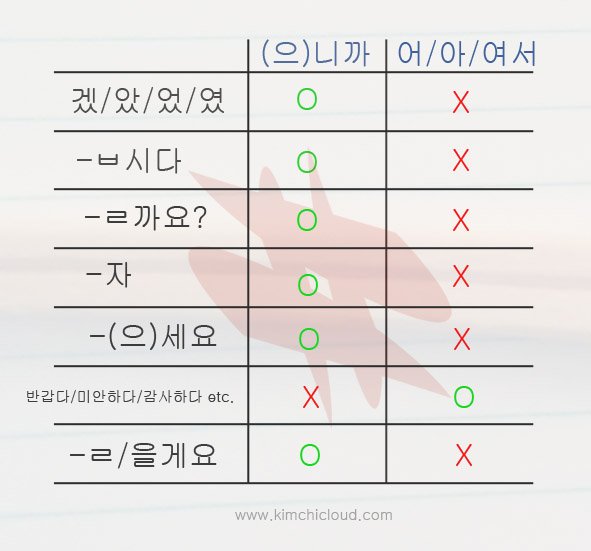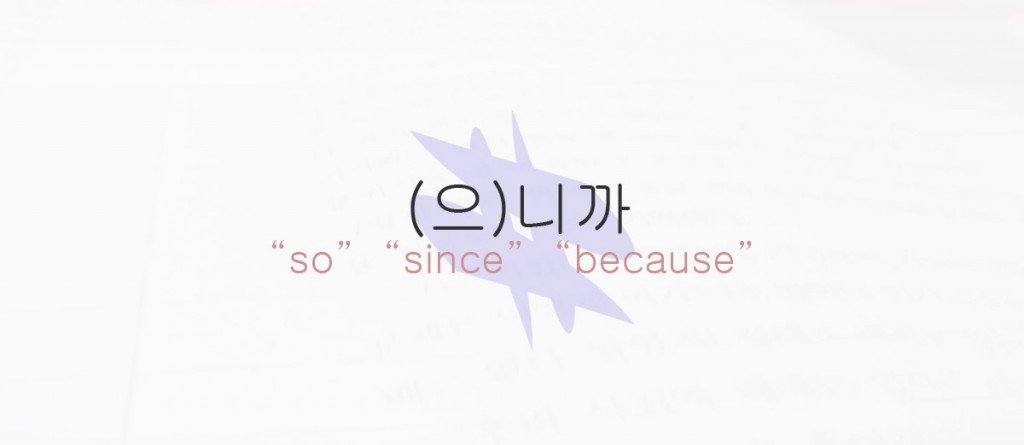– 니까 / 으니까 Grammar Lesson – so/because in Korean
니까 / 으니까 Grammar Explanation
In this lesson, we will take a look at the 으니까 grammar pattern which is one of the most common ways of saying “because” or “so” in Korean.
You might already be familiar with the ‘어서/아서/여서‘ grammar pattern which is used to express the same thing. Please note that there are some important differences between the two so please read on.
Usage
The preceding clause (the part that comes before this grammar pattern) is the basis for the following clause (what comes after it).
- VST + 으니까 (if the verb stems ends with a consonant), 니까 (if the verb stem ends with a vowel)
- Noun + 이니까 (if the noun ends with a consonant), 니까 (if the verb stem ends with a vowel)
- Both AVST (Verbs) and DVST (Adjectives) can be used, as well as nouns.
- Note that ㄹ, ㅂ irregular verbs conjugate like if the verb stems end with a vowel
- Both past tense (었/았/였) and future tense (겠) can be used with this grammar.
- Scroll down for some conjugation practice!
Difference between 어서 / 아서 /여서 vs (으)니까
If you’re taking a test in Korean, rest assured that they will test you on your ability to differentiate between these two grammar patterns. So make sure you know this well before it’s time for your test. Here are the main differences:
1. The biggest and most notable difference between the two is that ‘어서‘ can not be used with propositive (suggesting an action) or imperative (requesting or commanding an action) sentences, while 으니까 can.
배가 고파서 빨리 오세요. (X) – The sentence is imperative and can not be used with ‘어서’.
배가 고프니까 빨리 오세요. (O)
= I’m hungry so please come fast.
2. (으)니까 can not be used in common greetings and certain common expression. Use 어/아서 instead, for example:
만나서 반갑습니다 (O)
만나니까 반갑습니다 (X)
= Nice to meet you.
늦게 와서 미안해요 (O)
늦게 왔으니까 미안해요 (X)
= Sorry for being late.
3. You should use 으니까 when expressing a subjective reason, whereas 어서/아서/여서 is used to state a natural consequence. This difference can be very subtle and doesn’t necessarily make using one or the other incorrect, as they just express different nuances. But generally speaking, you should try to think of the two like this:
- If you could say “so, naturally…”, then you want to use 어/아/여서
- If it’s not common knowledge or not a natural consequence, you can use (으)니까. You can also use this if the person you are talking to knows about the situation. Like “as you know…so…”
4. You can not use past (았/었/였) and future (겠) tenses with 어서 / 아서 / 여서. That is to say, you can talk about something that happened in the past or happens in the future, but you can not use tense markers in conjugation with it. However, with (으)니까, you can!
왔으니까 (O)
왔어서 (X)
= because I came…
To make things simple, here’s a list of things you can, and can’t, use these for.

Please Note
- You will also encounter this in its shortened form (으)니 which means the same thing. So don’t be confused!
- 으니까 also has a second usage where it is used to express a realization after doing something. This usage often translates to “when” and you should follow it up with some sort of discovery or confirmation
학교에 가니까 아무도 없었다.
= When I went to school, (I realized) there was nobody there.
- You can use ‘그러니까‘ to connect two sentences (as opposed to merging two clauses). This word, aside from “because” and “so” can also mean “I mean…” or “That’s what I’m saying!
그러니까!
= That’s what I’m saying!
비가 올 거예요. 그러니까 우산을 가져 가세요.
= It’s raing. So please take an umbrella with you.
More Examples
몸이 너무 아프니까 아무것도 못해요.
= I’m too sick so I can’t do anything
위험하니까 조심하세요.
= It’s dangerous so be careful
비가 오니까 택시를 탑시다.
= Because it’s raining, let’s take a taxi.
Conjugation Practice
(Click for answer)
Please like or share if you found this lesson useful! And if you have any questions or something else on your mind, let us know in the comments below and we will do our best to help you out!
By: Kimchi Cloud






Very good and details explanation !:)
Leann, thank you very much for your comment!! ^^